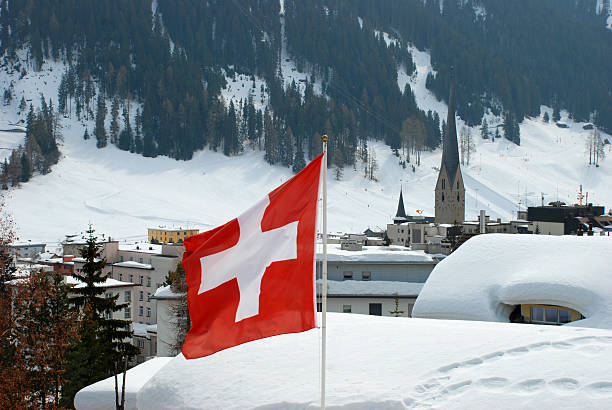Geneva/New York, January 17 – World government and corporate leaders have begun addressing the week-long, virtual annual meeting of the Davos Agenda 2022 in Switzerland with the pandemic and how the disease has affected the global economy and widened the gap between rich and poor countries as top issues. Organizers of the prestigious conference said the Davos Agenda virtual event “offers the first global platform of 2022 for world leaders to come together to share their visions for the year ahead.”
“Everyone hopes that in 2022 the COVID-19 pandemic, and the crises that accompanied it, will finally begin to recede,” said Klaus Schwab, Founder and Executive Chairman of the World Economic Forum. “But major global challenges await us, from climate change to rebuilding trust and social cohesion. To address them, leaders will need to adopt new models, look long term, renew cooperation and act systemically. “
The event at the scenic Swiss Alps resort of Davos (January 17-21) features heads of state and government, corporate CEOs and civil society groups. It will also mark the launch of several Forum initiatives including efforts to accelerate the race to net-zero emissions, ensure the economic opportunity of nature-positive solutions, create cyber resilience, strengthen global value chains, build economies in fragile markets, organizers said.
UN leader blasts unequal vaccination as “shameful”
UN Secretary-General Antonio Guterres said in his address that the world has failed on one particular demand to assist poor and vulnerable countries obtain Covid-19 vaccines and help the World Health Organization’s program to vaccinate 40 per cent of people in all countries by the end of 2021 and 70 per cent by mid-2022.
“We are nowhere near these targets,” Guterres said. “Vaccination rates in high-income countries are — shamefully — seven times higher than in African countries. We need vaccine equity, now.”
“We need pharmaceutical companies to stand in solidarity with developing countries by sharing licenses, know-how and technology so we can all find a way out of this pandemic.
“In situations where compensation may be warranted, developed countries should explore ways to provide it.
And we must prepare for the next pandemic through common sense investments in monitoring, early detection and rapid response plans in every country — and by strengthening the authority of the World Health Organization.”
Guterres asked participants to the Davos Agenda to act urgently on three issues: “confront the pandemic with equity and fairness;” reform the global financial system so it works for all countries; and “support real climate action in developing countries. Emissions must fall, but they continue to rise.”
“Coal-fired power generation is surging towards a new all-time record,” he said. “Even if all developed countries kept their promises to drastically reduce emissions by 2030 — and all developing countries achieved their Nationally Determined Contributions as written — global emissions would still be too high to keep the 1.5 degree goal within reach. We need a 45 per cent reduction in global emissions this decade”.
President Xi Jinping of China called for cooperation to jointly defeat the pandemic.
“The pandemic is proving a protracted one, resurging with more variants and spreading faster than before. It poses a serious threat to people’s safety and health, and exerts a profound impact on the global economy,” Xi said his government has locked down several cities to stop Omicron from spreading.
“Strong confidence and cooperation represent the only right way to defeat the pandemic. Holding each other back or shifting blame would only cause needless delay in response and distract us from the overall objective.”
Xi said China always delivered on its promises and has sent over 2 billion doses of vaccines to more than 120 countries and international organizations. He said China will provide another one billion doses to African countries, including 600 million doses as donation, and will also donate 150 million doses to ASEAN countries.
On the global economic situation, Xi said, “We should open up, not close off. We should seek integration, not decoupling. This is the way to build an open world economy. We should guide reforms of the global governance system with the principle of fairness and justice, and uphold the multilateral trading system with the World Trade Organization at its center. We should make generally acceptable and effective rules for artificial intelligence and digital economy on the basis of full consultation, and create an open, just and non-discriminatory environment for scientific and technological innovation. This is the way to make economic globalization more open, inclusive, balanced and beneficial for all, and to fully unleash the vitality of the world economy.”
Xi said the Beijing Olympic and Paralympic Winter Games will open soon. “We are confident that China will present a streamlined, safe and splendid Games to the world. The official motto for Beijing 2022 is ‘Together for a Shared Future’. Indeed, let us join hands with full confidence, and work together for a shared future.”
United Nations correspondent journalists – United Nations correspondent journalists – United Nations correspondent journalists
United Nations journalism articles – United Nations journalism articles – United Nations journalism articles

